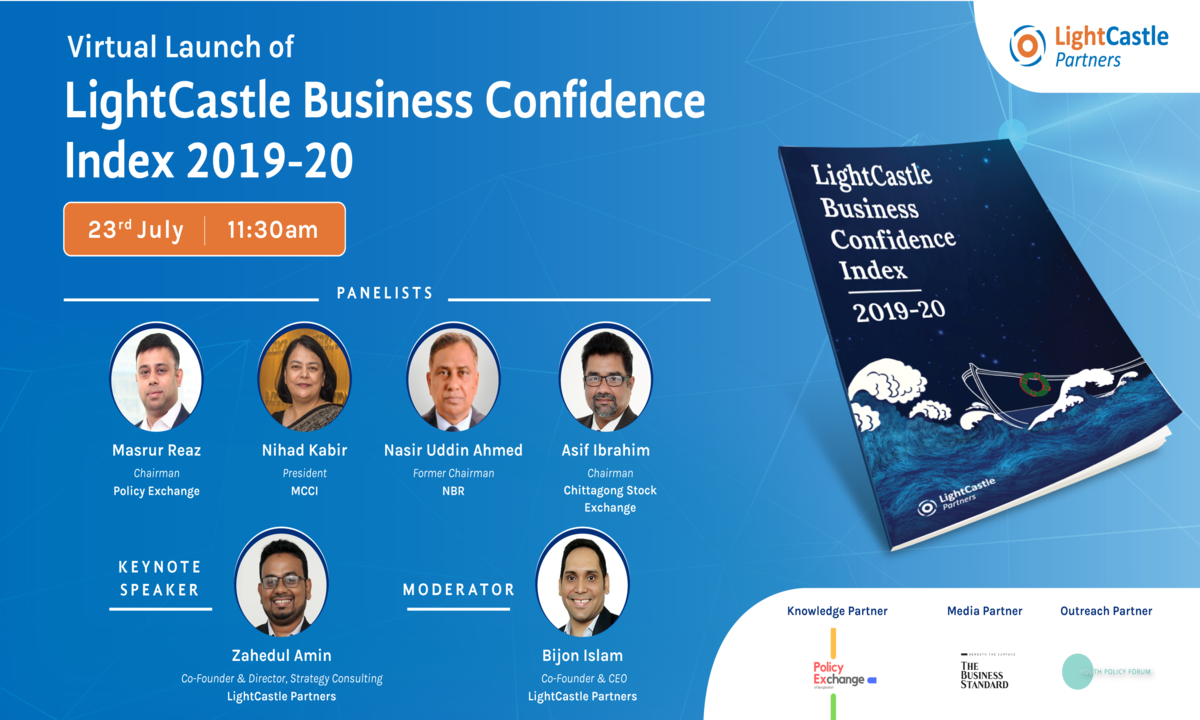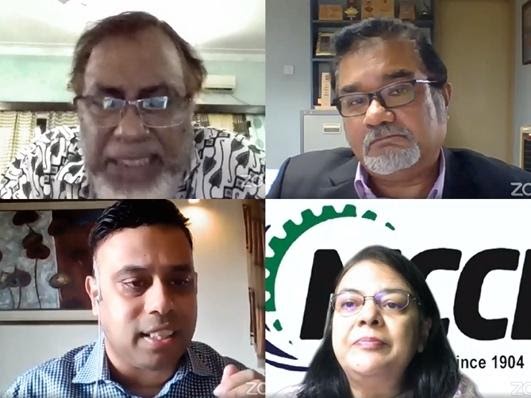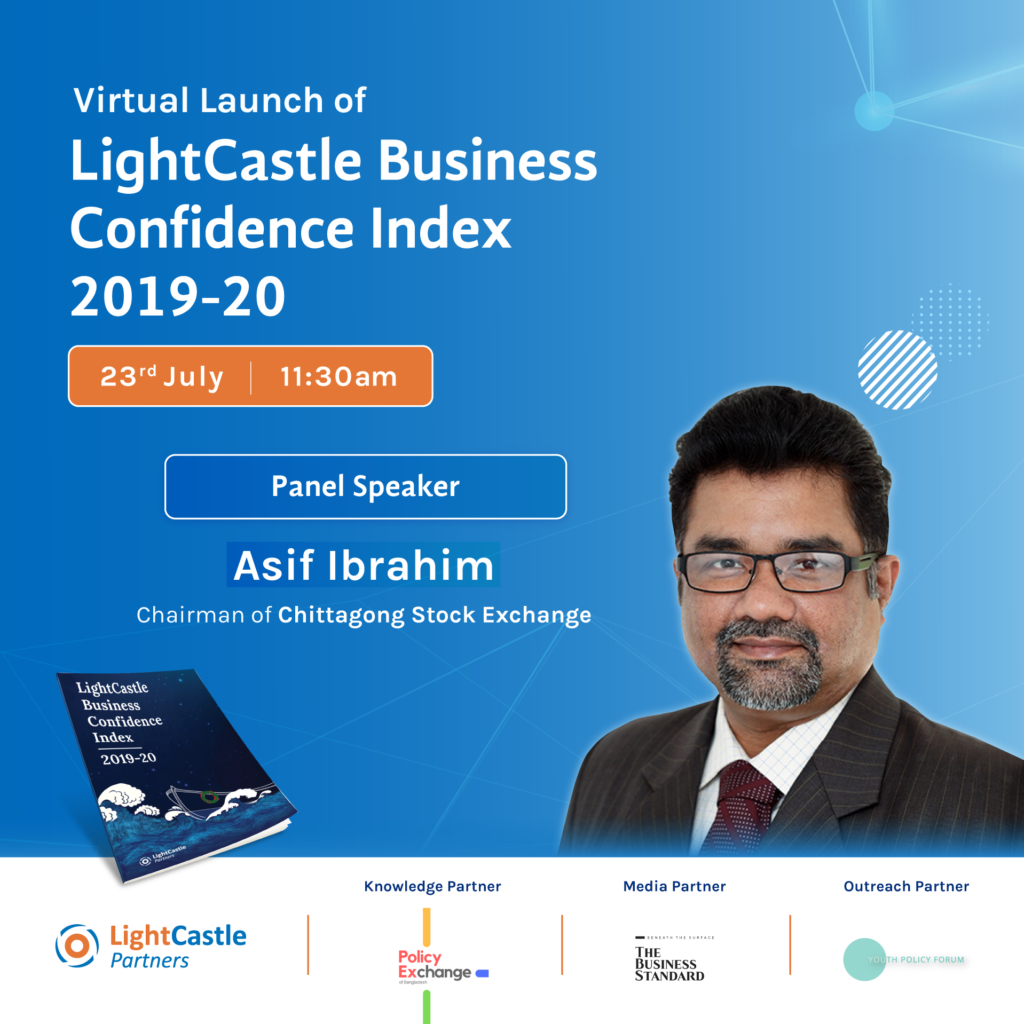GET IN TOUCH
- Please wait...

On July 23, 2020, LightCastle Partners virtually launched the third edition of their annual flagship publication, LightCastle Business Confidence Index (BCI) 2019-20. This year’s BCI aims at gauging the business sentiments of 59 private sector leaders (CXO members) across 20+ industries, having a notable contribution to Bangladesh’s economy.
The report launching webinar was hosted by Mr. Ivdad Ahmed Khan Mojlish, Managing Director, LightCastle Partners. Mr. Zahedul Amin, Director, Finance, Strategy and Consulting Services of LightCastle Partners delivered the keynote, highlighting major findings from the study. Mr. Bijon Islam, CEO, LightCastle Partners moderated a high-powered panel discussion featuring esteemed personnel spanning both the public and private sectors.
The Business Standard was the media partner, Youth Policy Exchange was the knowledge partner, and Youth Policy Forum served as the outreach partner of the event.


The BCI report aims at gauging the business sentiments of private sector leaders (CXO members) across 20+ sectors, having a notable contribution to Bangladesh’s economy. This year’s business confidence is found to be critically low, -19.27, influenced largely by the pandemic induced uncertainties and the fragile state of the financial sector even before the global crisis. The previous editions of the report saw the private sector confidence at +43 (2018) and +39 (2017) respectively. The index is determined on a scale of -100 to +100 using Harmonized Expectation Indicator (HEI).
Key problem areas on a macro level were the diminishing export receipts and reduced foreign remittances: the two fundamentals in which the nation’s economy is dependent upon. On a meso level, depleted demand, curtailed capacity and inadequate infrastructure were highlighted as the major bottlenecks. Based on these factors, 80% of C-suite members surveyed believe that the performance of the economy would deteriorate in the coming 6 months. The Key Note Speaker of the event Mr. Zahedul Amin said that “Low debt to GDP Ratio and Forex Reserves will act as a cushion against the current economic shock. He also emphasized on the importance of diversification of export basket to reduce dependency on RMG and considering deferment of LDC graduation in 2024 in order to revive the economic wheel.”
Almost 40% of the CXO members responded that they are on the process of employee layoff, with the inclination more prominent in manufacturing sectors such as Leather & footwear, and RMG & Textile. Furthermore, 1 in every 3 respondent expects lower sales in the coming months. Employment, however, is expected to increase in technology-driven industries such as ITES, digital advertising, and, E-platforms.
The study also highlighted on the status of the financial sector in accordance to the rising NPLs, low private sector growth credit, high interest rates on government savings schemes and the brunt from the potential wave of defaults that need to be borne by the commercial banks deriving from the Covid stimulus packages.
The Top 3 industries to hold the most promise was found to be the Pharmaceuticals sector, Agriculture and Agro-processing sector, and the IT and ITES sectors, owing to the structural and competitive strengths of these industries and alignment with anticipated changes in consumer lifestyle. The selection of these Top 3 sectors remains unchanged since the 2017-18 BCI. Remarkable gains were made by the money transfer network sector (encompassing fintech, DFS, and MFS) and the e-Commerce and e-Services sector, which appeared among the most promising sectors in the BCI for the first time in this edition, representing their intrinsic growth potential and buoyed, no doubt, by the emerging importance of these sectors will have in a post-pandemic world.
To get access to the full BCI 2019-20 report, please click here or visit the official website of LightCastle Partners.
The discussion was initiated with Mr. Masrur Reaz, Chairman, Policy Exchange. He elaborated on the importance of employment protection along with strengthening the Micro, Small, and Medium Enterprises (MSME) in order to revive the post-pandemic economy of the nation. Barrister Nihad Kabir, President, MCCI, focused on the widening skill gap among the youth in Bangladesh, along with the need to create more entrepreneurs. Dr. Nasir Uddin Ahmed, Former Chairman, National Board of Revenue (NBR), conveyed the difficulties faced by MSME entrepreneurs to access banking facilities and the need for government to leverage alternative financial tools to lessen the heavy reliability on the banking sector. Mr. Asif Ibrahim, Chairman, Chittagong Stock Exchange, touched on the need to digitize the capital market as well as the need to adopt new global RMG manufacturing practices for a sustainable economy.
To view the full virtual launch webinar, click here.
The key insights from the esteemed panelists are summarized below:

Mr. Reaz discussed that the economic recovery post pandemic will be dependent on the number of jobs lost and the number of new employment opportunities generated in the upcoming few months. According to the Bangladesh Institute of Development Studies (BIDS), 16 million jobs have been lost in Bangladesh since March 2020, which is almost 1/3rd of the total workforce. Employment protection in Bangladesh is required in the short term; the stimulus given to the RMG industry does cover this, however, a broader range of industries require similar incentives to retain workforce and to avoid the unemployment rate going spiral.
Bangladeshi migrant workforce took a significant hit due to the global pandemic as most of the Bangladeshi migrant workforce are employed as blue-collar workers in the informal economy in GCC and western countries. The remittance inflow for Bangladesh was heavily impacted as these blue-collar migrant workers were the most vulnerable to the impact of economic lockdown on the western countries and the reduced construction projects in the GCC due to depressed oil prices.
As more migrant workers are returning to their hometown due to layoffs, they can rejuvenate the rural economy through entrepreneurship leading to further employment generation. The government of Bangladesh (GoB) needs to strategize and formulate an action plan to assist the MSME in a timely manner. Regulatory burden placed on these MSMEs needs to be reduced by removing advanced VAT and facilitating the access to banking.

According to Barrister Nihad Kabir Bangladesh has one of the best policies for FDI in South East Asia. However, it is not regulated nor implemented properly. For many of the major multinational corporation such as Unilever, Nestle, and Telenor, Bangladesh is one of the largest markets for them to operate in. Sadly, Bangladesh has a negative image in the international arena as complexities and volatility in the tax structure make it challenging for foreign investors to plan financial investments in Bangladesh. Additionally, the perception that doing business in Bangladesh is tough due to red-tapism and complexity of following all the rules and regulations is tedious and discouraging. FDI suffers due to National Board of Revenue’s resource limitations in making appropriate tax policies and establishing an efficient revenue collection system. Barrister Kabir believes that implementation and regulation of policies should be given due importance like policy formulation.
Barrister Kabir opined that the pharmaceutical sector of Bangladesh has an advantage in foreign markets as the industry can experience tax privileges due to its Least Developed Countries (LDCs) status. Once Bangladesh formally graduates from LDC, the competitive advantage of the industry will be put to test.
For instance, leather industry, while showing promise, unfortunately couldn’t live up to the expectations due to lack of policy regulation. She also mentioned that the service sector, such as health and elderly care, is currently being overlooked and should be considered due to its high demand in foreign markets following the current global pandemic.
Barrister Kabir stated that a fundamental shift in the education sector of Bangladesh is required to mitigate the skill gap of the youth. Skill development is the key to facilitating employment generation in the future, as Bangladesh requires more job creators than job seekers.

According to Dr. Nasir, GoB should consider delving into utilizing other financial tools such as the bond market. One possibility could be to use Sovereign Bonds to borrow money from the market, similar to many other countries who have utilized this tool during macro financial crisis. In his opinion, GoB should focus on expanding the existing shallow bond market. Using foreign exchange is a good initiative taken by the GoB provided it is dealt with caution. Excessive foreign exchange reserve usage will disrupt the balance of payments and could lead to appreciation of the Bangladesh Taka (BDT). Appreciation of BDT against the United States Dollar (USD) should be discouraged due to its negative impact on the remittance inflow.
Indicators, such as World Bank’s Doing Business, shows that Bangladesh is not well off in terms of cost of doing business as it is remarkably high and hence the businesses confront much harassment. In his experience in government offices, there are some bureaucratic challenges that need to be mitigated while a shift in the mindset of the policymakers is simultaneously necessary. This change needs to happen so that the overall doing business scenario in the country improves.

Mr. Ibrahim has stated that many of the major foreign buyers in the RMG sector have already started to reinstate the order, while several top brands have announced bankruptcy. BGMEA had initially reported cancellation of USD 9 Billion worth of orders, but about 43% of orders have been reinstated which amounts to USD 4 Billion.
To him it is imperative for Bangladesh to shift its focus on exporting more to the US market with the prolific growth of Vietnam in the RMG sector. Capturing the US market is vital for the growth of the RMG sector of Bangladesh.
Along with that, Bangladesh RMG factories must utilize data instead of following their intuition while making business decisions. One study by PwC shows that MMF apparel is going to be the trend in the future, however, most factories are heavily producing cotton-based fabrics. It is vital for the RMG businesses to redirect their attention to online marketplace. They need to strategize and focus on smaller batches of production accordingly. RMG factories need to practice lean manufacturing to reduce waste and increase productivity along with using a modular manufacturing process to help with boutique production.
Adopting the use of Fintech is vital for developing the capital market in Bangladesh. The stock market had to be closed for 66 days, which was not ideal, and the instance could have been avoided if the market was digitized. In Bangladesh, the base of the digitization process can be adopted from neighboring countries so no fundamental shift in technology is required.
According to Mr. Ibrahim, integration in SAARC has not been beneficial for Bangladesh. Joining other trading blocs such as ASEAN can rather be considered. Bangladesh should try to join ASEAN as an observing member first then try to become a full member.
The discussion put forth the importance of not only creating policies and implementing them in an appropriate method but also to think beyond the big industries and focusing on the MSMEs. While fundamental changes need to be brought into the banking system to better facilitate the MSMEs, re-integration of the returning blue-collar migrant workers in the Bangladesh economy cannot be neglected either. Finally, he highlighted the need to venture out in terms of trading and not only export to the traditional markets while also having the need for better trade agreements.
Our experts can help you solve your unique challenges
Stay up-to-date with our Thought Leadership and Insights